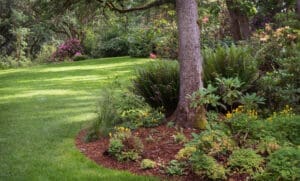In the Pacific Northwest, spanning from the Canadian border to North California, residents are blessed with breathtaking natural beauty. From towering evergreens to cascading waterfalls and rugged coastlines, the landscape serves as both a source of inspiration and a call to stewardship. As we seek to enhance our outdoor spaces, the concept of sustainable landscape design emerges as a guiding principle, offering a harmonious approach to coexist with nature while crafting enchanting outdoor havens.
 At Hilton Landscape Supply, we understand the profound connection between people and their surroundings. We believe landscaping isn’t merely about beautifying outdoor spaces but also about fostering ecosystems, conserving resources, and promoting biodiversity. Sustainable landscape design embodies these principles, creating spaces that thrive in harmony with their environment while minimizing ecological impact.
At Hilton Landscape Supply, we understand the profound connection between people and their surroundings. We believe landscaping isn’t merely about beautifying outdoor spaces but also about fostering ecosystems, conserving resources, and promoting biodiversity. Sustainable landscape design embodies these principles, creating spaces that thrive in harmony with their environment while minimizing ecological impact.
Elements of Sustainable Landscape Design
So, what exactly is sustainable landscape design? At its core, it’s about employing practices and utilizing materials that support environmental health, conserve water, reduce waste, and enhance biodiversity. Here are some key principles to consider when embarking on your sustainable landscaping journey:
1. Native Plants Selection
One of the fundamental elements of sustainable landscaping is using native plants. Native species are naturally adapted to the local climate, soil, and wildlife, requiring minimal water, fertilizer, and maintenance once established. By incorporating native plants into your landscape, you not only create habitats for local wildlife but also conserve water and reduce the need for chemical inputs.
2. Water Conservation
In regions like the Pacific Northwest and Northern California, where water resources can be scarce, efficient water management is paramount. Sustainable landscape design emphasizes using water-wise irrigation systems such as drip irrigation and rainwater harvesting techniques. Additionally, selecting drought-tolerant plants and implementing permeable hardscapes can help minimize water runoff and promote groundwater recharge.
3. Soil Health
Healthy soil is the foundation of a thriving landscape. Sustainable landscaping practices focus on improving soil fertility, structure, and microbial activity through organic amendments, compost, and mulch. By nurturing the soil ecosystem, you can enhance plant health, increase water retention, and reduce the need for chemical fertilizers and pesticides.
4. Wildlife Habitat Creation
Encouraging biodiversity is a central tenet of sustainable landscape design. By creating habitat features such as native plantings, bird feeders, pollinator gardens, and wildlife corridors, you can attract a diverse array of beneficial insects, birds, and other wildlife to your garden. These ecological interactions contribute to a balanced ecosystem and promote natural pest control, reducing the reliance on harmful chemicals.
5. Energy Efficiency
Landscaping elements can also play a role in enhancing energy efficiency around your home. Strategic placement of trees and shrubs can provide shade in the summer, reducing the need for air conditioning, while allowing sunlight to penetrate during the winter, reducing heating costs. Incorporating permeable surfaces and green roofs can also mitigate the urban heat island effect and improve stormwater management.
6. Waste Reduction and Recycling
Sustainable landscaping extends beyond plant selection and water management to encompass waste reduction and recycling. Utilizing locally sourced materials, such as natural stones and recycled aggregates, minimizes transportation emissions and supports the regional economy. Additionally, composting green waste and recycling landscape debris can divert organic matter from landfills and create nutrient-rich soil amendments.
Find everything you need for a healthy yard and garden at Hilton Landscape Supply.
By embracing these principles of sustainable landscape design, homeowners can create outdoor spaces that not only delight the senses but also nurture the environment. At Hilton Landscape Supply, we’re committed to providing the tools, materials, and expertise you need to bring your sustainable landscaping vision to life. From organic soils and mulches to native plants and eco-friendly hardscape options, we offer a comprehensive range of products to support your journey towards a greener, more sustainable future. Together, let’s cultivate landscapes that not only enhance our lives but also preserve the natural wonders of our region for generations to come.
